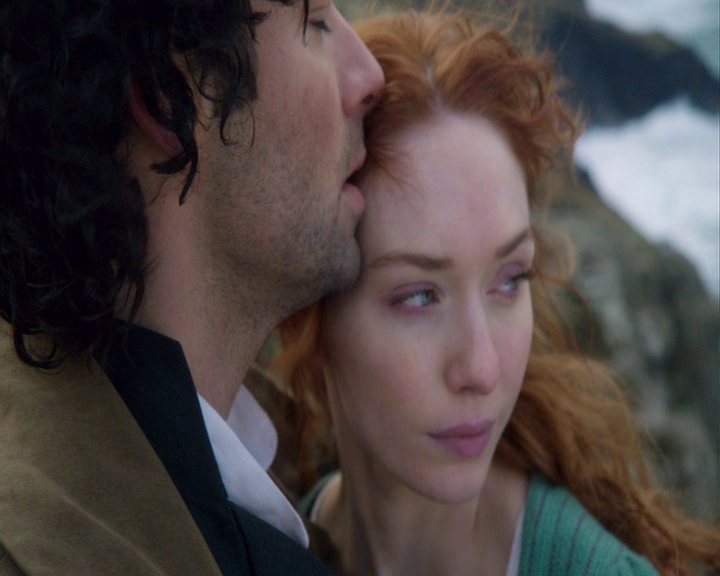
Ross (Aidan Turner) and Demelza (Eleanor Tomlinson)
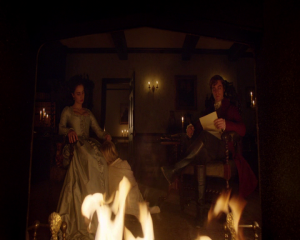
Elizabeth (Heida Reed), Geoffrey Charles (unnamed) and George Warleggan (Jack Farthing)
She’d say life holds only two or three things worth the having, and if you possess them the rest don’t matter, and if you do not possess them the rest are useless (Graham, Warleggan, Bk 4:Ch 5, p 439; repeated in screenplay but attributed to Ross rather than Demelza, screenplay, 70 INT, pp 578-79)
Dear friends and readers,
[Note: this blog assumes the reader has read Graham’s novels, viewed the 1970s mini-series, and is interested in the art as well as content of the books and this older and the new 2015-16 mini-series. I don’t re-cap, expect the viewer to have seen the film, understood the story, and remember it generally.]
So we come to the end of the second season of the Debbie Horsfield’s new Poldark and Winston Graham’s powerful fourth novel, Warleggan. I was powerfully moved by the new finale, which remained close in most respects to the book, but have to admit I was equally deeply engaged by its counterpart in 1975, Jack Russell’s Episode 16, whose events moved so far from the book so as to present a different story, but whose sense and spirit were a theatrically Jacobin version in spirit of the book (rather like Jack Pulman’s Episodes 3 and 4 related to the conclusion of Graham’s first novel, Ross Poldark). I burst into tears at the 1975 version, not just because Demelza’s beloved dog, Garrick, is shot by Warleggan’s thugs, but at some wrenching of me within as Ross (Robin Ellis) and Demelza (Angharad Rees), continue fiercely to tear at one another.
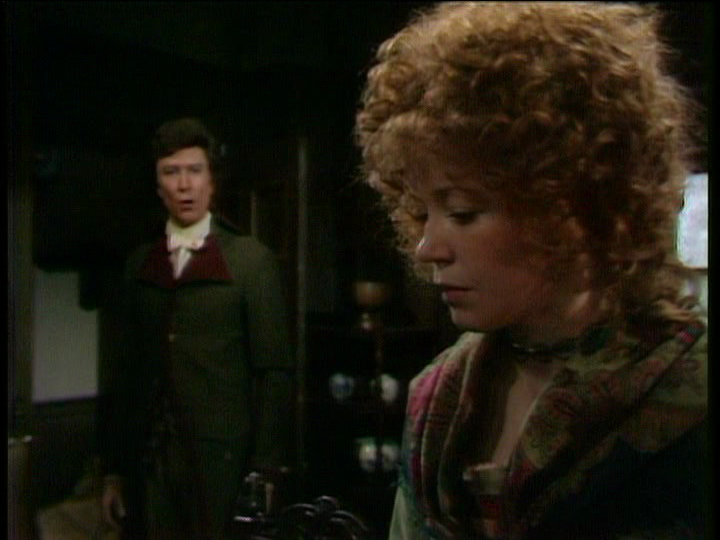
I didn’t cry during this second iteration because I have a hard time accepting one of the changes Horsfield made: in Graham’s book and in Russell’s rendition, well before Ross’s last visit to Trenwith to talk with Warleggan and (in the book) Elizabeth, Demelza makes the difficult effort to forgive, accept, and let her love for Ross come out and respond to him again so that they could have gone to bed again (Bk 4, Ch 3, pp 413-414 — he feels he will wait until she will feel no reserve once again). In Warleggan they do quarrel angrily in the last scene (over very different and woman’s way of seeing his conduct and his refusal to acknowledge her understanding of what happened is just too), such that they nearly break up as they nearly do in Horsfield’s version (Bk 4, Ch 7, pp 460-66). In my view Graham stopped writing the series for 20 years because he had reached such an impasse, with Ross still at least longing for Elizabeth to acknowledge an ex-love (she won’t, now that he never turned up after the rape, left her pregnant, and she has had to marry a man she doesn’t love and who she knows doesn’t love her, she hates Ross), and Ross and Demelza reconciling themselves to the reality of conflicting emotions they must live with. But Horsfield and Eleanor Tomlinson’s Demelza reached a point of bitterness, sarcasm (she jeers at Ross — “What it is to be married to such a great man!”)), spite in her eyes, hate in a visit to Elizabeth (not in the book)
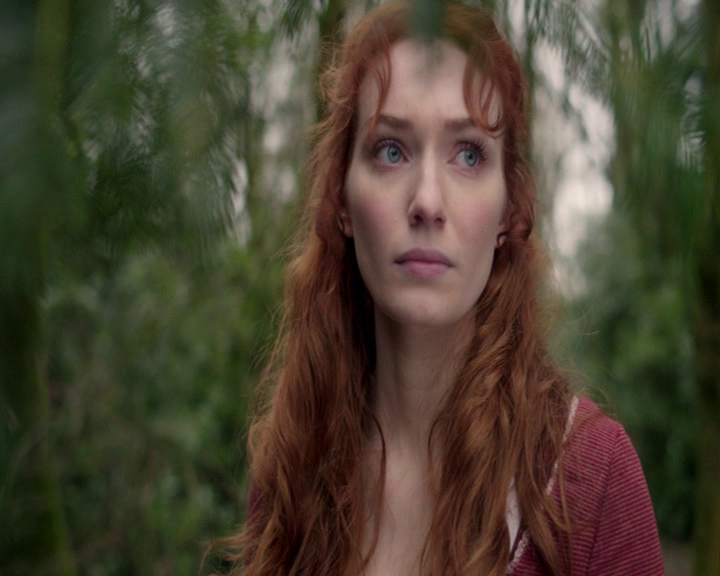
Demelza confronting Elizabeth
Elizabeth: ‘Why have you come?’
Demelza: ‘I thought ’twas to tell you that I hate you. That you’ve marred my faith and broke my marriage. That I envy you. for the passion you roused which Ross could not withstand. That I pity you … But now I wonder what do any of it matter? what you did — what Ross did — cannot be undone. And you both must live with that. But I need not.
and reluctant grudging silence even in her last scene with Ross, her eyes so narrow, her face so pinched, that I felt alienated from the character I had bonded with. I found it just so painful that she did not seem to value Ross, invest her whole being there (the way I had with my husband and have imagined Demelza does in the book). A part of my deep joy in the novels is the character of Demelza as imagined by Graham and she is never hateful with fierce looks of spite; never stalks anyone. I can respond better to open hurt than rigid withholding of the self and resentment. Horsfield’s conception and Tomlinson’s acting makes deep pyschological sense, but I could find little to comfort myself with here. I felt for Aidan Turner as Ross, remorseful, trying to be honest (she says he is not honest when he is), and clinging to her (Horsfield gives Graham’s Demelza’s words to him (see above). In the long feature to the DVD of this second season, Jack Farthing remarks that the series “is not a museum piece,” but treats of issues, presents characters of direct contemporary relevance today. In book and this episode she does sow doubt in Ross’s mind that she just might have gone to bed with MacNeil (Henry Garrett) and the scene of Ross’s anger at this in this episode’s penultimate scene is word-for-word from the book and very good (and not in the 1970s version where Demelza never moves away from Ross at all), and she does threaten to leave with Jeremy, but in the last pages of the book and here on the cliff again does not.
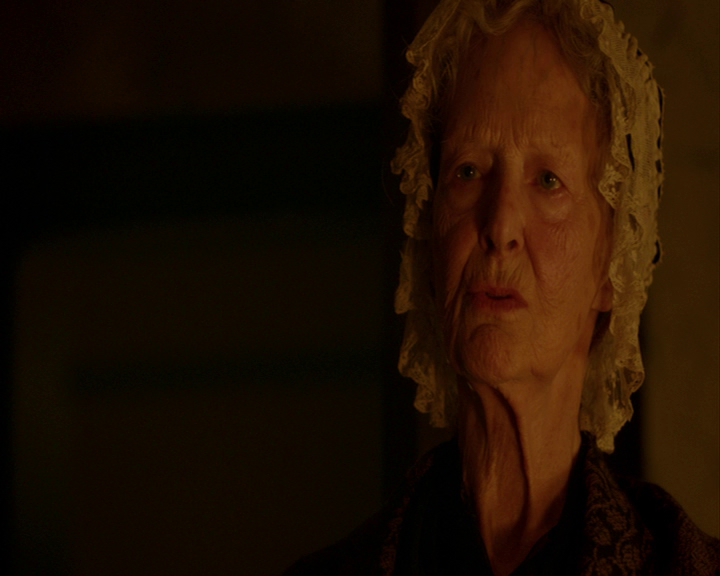
Agatha has nearly the last words of the episode as she tells Elizabeth she has made a pact with a devil and warns the baby may come in February (9 months after May 9th, the night of the rape)
For the record the changes in Demelza are not the only way Horsfield departs from the Warleggan (perhaps, some would say, modernizes). Some of the material comes from Black Moon (Book 5); so too George’s attempt to part Geoffrey Charles from Elizabeth in Black Moon, Elizabeth’s fuller realization her coming baby might be Ross’s – she suspects, worries but the realization comes later. Here it comes at the close from Aunt Agatha’s (Caroline Blakiston) insight; entirely new (not in book, not in earlier series) is the way Horsfield has developed the relationship of Agatha and Elizabeth. Agatha functions in the way the fool did in Elizabethan drama: she tells Elizabeth truths Elizabeth doesn’t not want to hear but knows in her heart. In Warleggan she realizes George has married her as a trophy, is not manageable or comfortable to be with as Francis, but it takes the time passing in Black Moon for her to see she has married a mean bully in George.
The mob scene is the invention of Jack Russell. There is none in Warleggan (as Pulman invented the idea that Charles Poldark took a needed £300 from Ross after he borrowed it from Pascoe, and Horsfield changed that to Charles trying to bribe Ross to leave). Horsfield has not allowed this natural result of enclosure and destroying the tenants’ houses to move into open riot, murder (the crazed lonely Paul Daniel is shot through the chest by Warleggan in 1975), nor allowed Trenwith to burn down, but the episode does give us a theatrically effective rendition of the rage the tenants and all around Truro George’s behavior is causing. Having Trenwith burn down in the older series made havock with Black Moon and Ross and Agatha’s deep resentment and George’s exultation to be in Trenwith. I object to the new way it’s done where Horsfield far more blames the workers (as a foolish group, not a starving deeply wounded people with nothing to lose) but the new episode gives Ross a chance to redeem himself by stopping the riot and appealing directly to Demelza to come home with him. He has come for her.
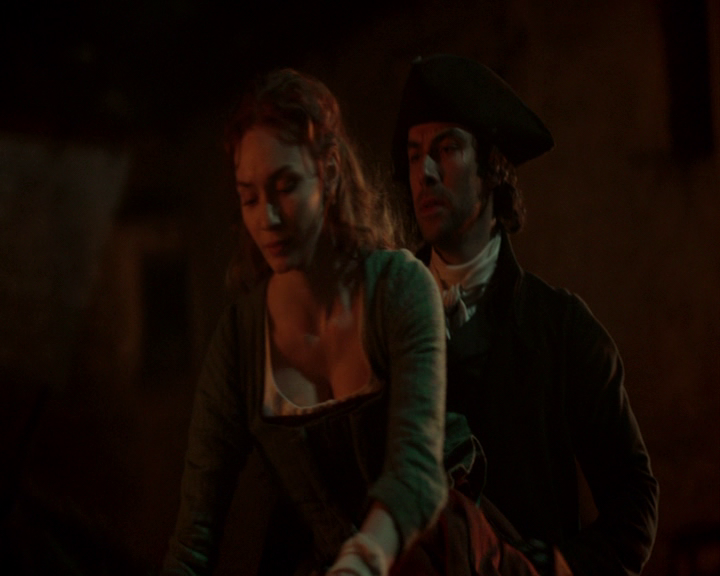
Demelza climbing up in front of Ross once more
Jack Russell has Ross called to war to join his regiment (this is anachronistic), so that at the close he leaves Demelza with Jeremy; there is nothing like this in the book — for the very good reasons Pascoe (Richard Hope in this version) and Dwight Enys (Luke Norris) in the new episode tell him not to: he needs to be there to develop his thriving tin business, to keep up his family. But Horsfield picks this up too as theatrical; he joins Dwight in London after the disillusioned Dwight (he has been told wrongly that Caroline has engaged herself to a Lord Coniston) has signed up, but cannot get himself to leave. Horsfield conveys the ominousness of war through having Jeremy play with toy soldiers against the larger background of taverns, and men readying themselves. There is much less romance to it than there was 40 years ago.
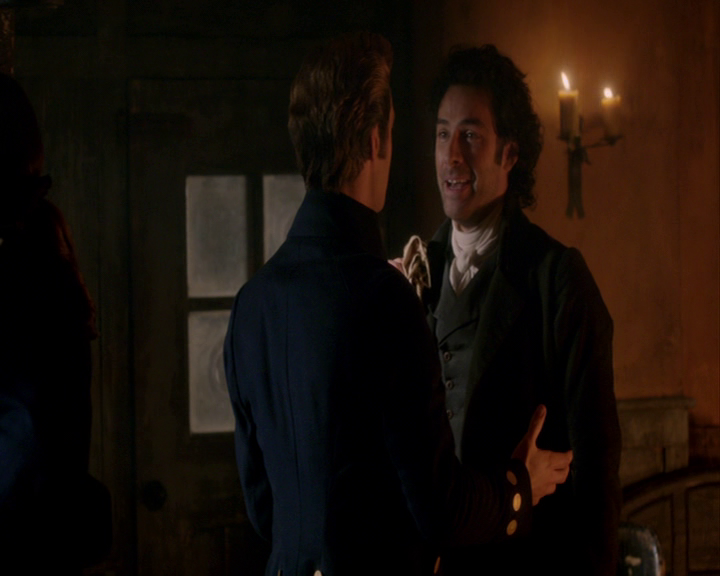
The two friends reunited
Much was done very well –- and the parts that were closer to the book finer in conception, subtler, making more true sense than what Russell concocted (see my account in the comments). In general throughout both seasons 1 and 2 of this Poldark and the whole of the previous, where the writer is closer to Graham, the series is better. As so common, it opens with Ross and (now) Henshawe, Paul Daniel all working at the mine. Only now Demelza is not there; she is not helping but acting out the “elegant” lady, walking in the meadow. We move to Trenwith where George is having Francis’s picture removed, placating Elizabeth with a dual portrait of them in its place(by the “celebrated John Opie — “oh George,” says the fool, “you spoil me”), all the while thinking of how he may part her “reasonably” from Geoffrey Charles (a good school you see) and plotting with Tankard to shoot people on sight who take the hitherto public right of way, and by the next scene seeking to wrench from Ross the shares he paid Elizabeth for from Wheal Grace while they were worthless. In this second scene, Elizabeth lurks by the door and does realize for the first time that Ross had tried to help her, but after a ferocious physical battle where Ross tries to burn George, and he has his men eject him after smashing his face, she seems to side with George. Jill Townsend’s Elizabeth was cooler, assessed George better (as does Graham’s), knew she was caged upon marriage.
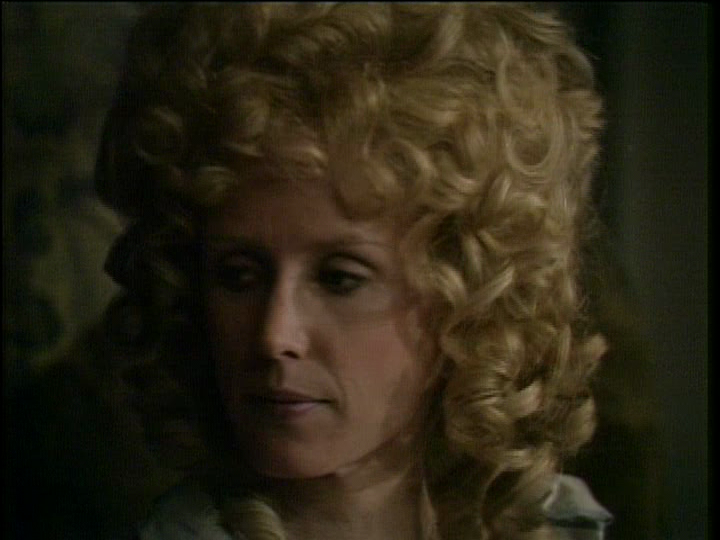
Townsend’s face hardens as she realizes George will not keep any of his promises (to take her to London, to provide her with a great lady social life ….)
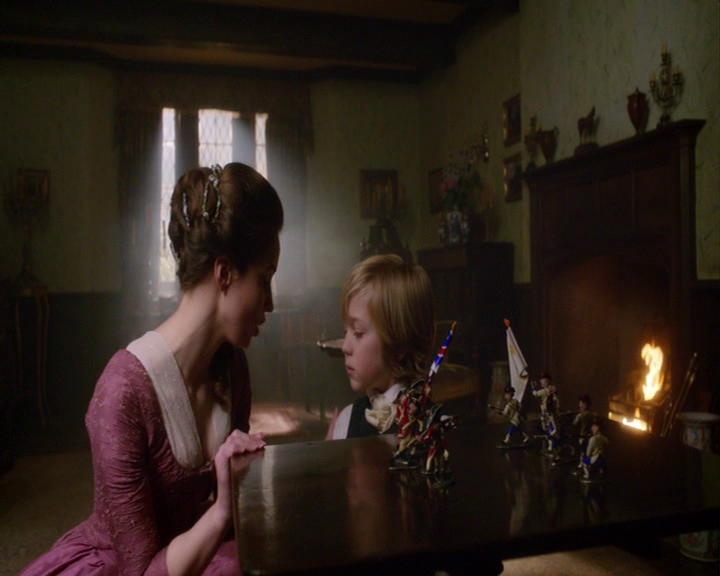
Reed is ever soft: the scene ends now with her telling her boy, George will be his papa now — the child is not impressed
The Dwight and Caroline (Gabriella Wilde) scenes and especially when John Nettles as Ray Penvenen is there are very well and carefully realized. Nettles is a fine actor, and a deeply appealing uncle, who conveys complex feelings: we have the scene where Dwight tells him he has “the sugar sickness” and will not get better by altering his diet (no wine) but may prolong his life.
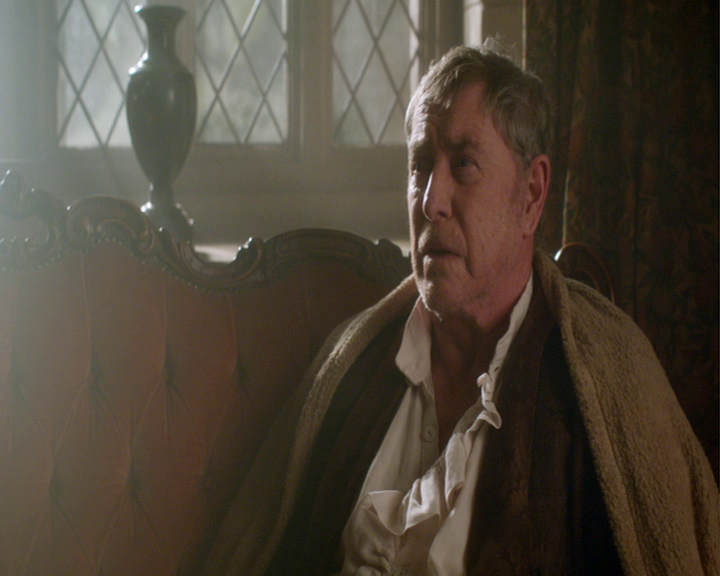
I cannot warm to Horsfield’s conception of Caroline as a shallow egoistic heiress slowly growing up; by contrast Judy Geeson is shown as genuinely caring for the beaten down impoverished Rosina Hoblyn:
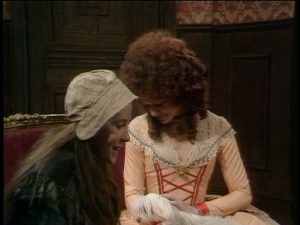
Jack Russell’s Caroline hires Rosina as her maid (very anachronistic). Neither is quite Graham’s conception: Graham’s Caroline is a hold-over from the gay witty lady of Restoration comedy, and becomes humanized through her flirtatious relationship with Ross, friendship with Demelza and her ambiguous marriage to Dwight (she does emasculate him somewhat, and in the later books he holds himself apart). But there is something touching about Wilde’s behavior, how she holds her body, when Ross comes to thank her, and brings her back to Dwight (she stands there looking more penitent than ever seen before). It’s pure romance:

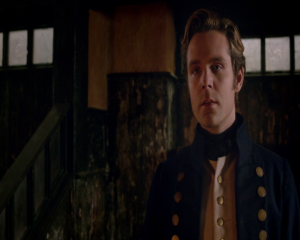
I was moved when after the lovers’ night together, she returns to her lonely uncle to care for him.
I also warmed to the added scene of Verity’s (Ruby Bentall) childbirth: her step-daughter has now sofened towards her; the whole scene is not literally in the book but a fair extrapolation. And it gives Horsfield a chance to have the sympathetic Verity try to talk Demelza into accepting and forgiving, into remembering, believing Ross does love her — and not to let go of that.
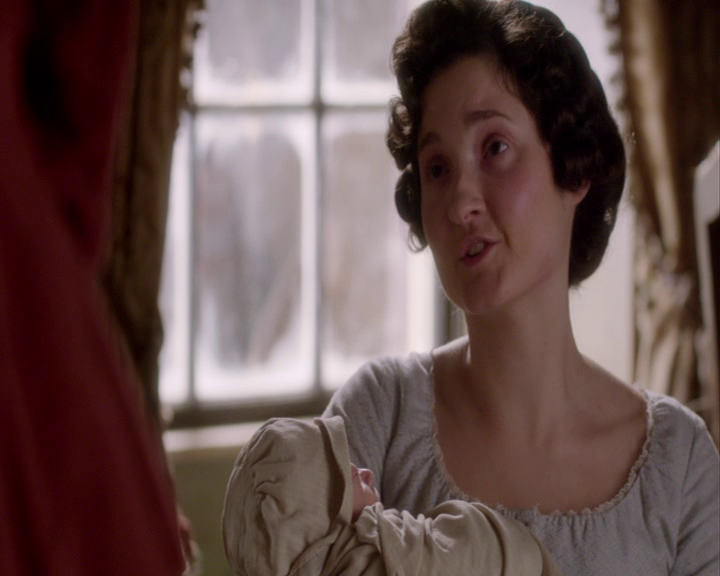
Verity is dropped from the books, marginalized as a character from the time of Black Moon on. In Graham and the 2nd season of the 1970s Poldark (1977-78), instead Demelza’s great friend becomes Caroline Penvenen Enys. I hope Horsfield changes that, and keeps the sister-friendship up as she has developed the aunt-niece relationship of Agatha and Elizabeth.
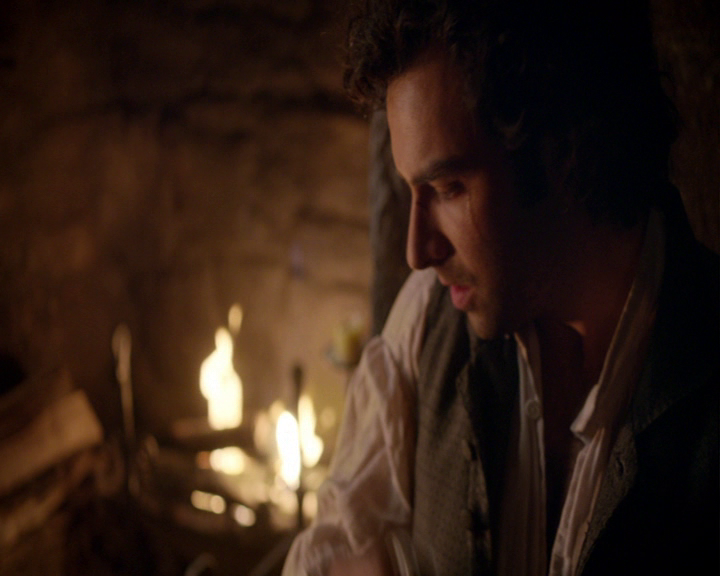
Turner in one of several scenes between him and Demelza where he is reasoning with her, trying to apologize, to explain himself.
I thought Turner superb in the episode: it was a hard part. He had to be didactic and explicitly say moral things left to interior thoughts in the book and he did it very well. I found him very appealing throughout. He has become this complicated character thoroughly, driven, with many conflicting loyalties, rightly fiercely protective of everything good which Warleggan would blight. Given the present horrible things going on in the US where a man has taken power and is inflicting pain and deprivation on the majority of Americans, treating non-whites as semi-criminals (they are not safe in the streets anymore), having immigrants snatched up and deported to anywhere, prosecuting parents, increasing private prisons (shown to be cruel to prisoners), Ross Poldark is now an important hero for our time in a way he has not been since the 1940s when he was conceived as an antidote to the barbarism and nightmare war of mid-century Europe. His finally striking out at George, meaning to kill him almost unless stopped is another moment of understandable rage for the character who is emerging as flawed but meaning and doing well often (exemplary in most ways). Farthing is acting George as he is in the book (and as Ralph Bates acted him in the 1970s), we see the banality of evil, cold selfishness, no care for anyone but himself and those he deems extensions of him. I regret they dropped his father Nicholas as a semi-moral villain, slightly comic, amusingly acid (Allen Tilvern); we are in an era where there is no room for comedy and so we have the icy relentless Cary Warleggan (Pip Torrens).
A telling repeat image in this episode is that of people writing letters to one another; we see George writing, and and switch to Ross writing and back again:
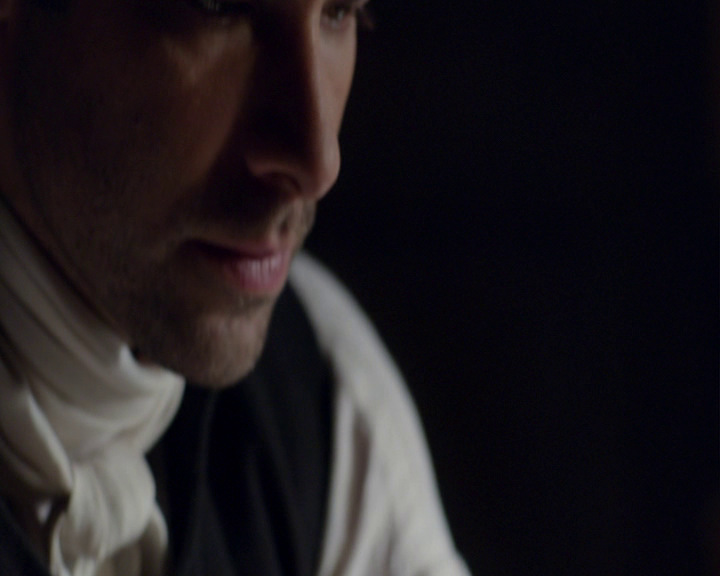
There are scenes of signing, Dwight leans down to sign his return to the navy (as a doctor aboard a ship), Ross nearly signs, he takes documents from Pascoe to London. George is continually among his documents, looking at them (as was Ralph Bates in 1975). No longer boxing and fencing with someone, but attacking the world through ownership and lawyers.

Not a museum piece as Farthing said.
I aim to reread the coming novels, Black Moon and The Four Swans this summer and am now eager for the third season and for all twelve novels to be adapted into this film adaptation. I also hope they will keep the same actors when after The Angry Tide, the series must move ahead ten years to The Stranger from the Sea. As with The Pallisers (where they age considerably) or I, Claudius, I would enjoy seeing the actual presences grow older and change and endure on.
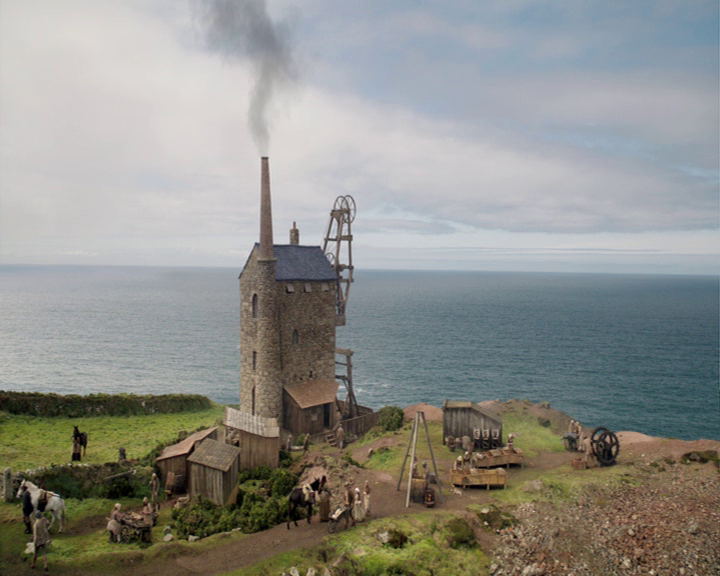
The working mine the set-designers keep to
In Maureen Turim’s book, Flashbacks in Film, on history: she makes the point how Hollywood films seem always to tell a political or historical story through the story of individuals; one must. Her philosophical criticism is that this must distort realities, especially as often the film-makers choose exemplary characters and of course they get to chose what example they want to present, and often provide a happy ending. One way the history film can get past this is the use of flashback, montage, retrospective, wide far shots, the characters remembering: well at the close of Poldark on the cliff and in the returns to the symbolic buildings, Trenwith, Nampara, the village, that’s precisely what the film-makers are suggesting.
Next up: Outlander, the second season, when I’ve finished War and Peace. Just now I am watching in a row all the Anna Karenina movies, and especially loving the 1978 13 part BBC mini-series written by Donald Wilson, the same man who wrote much of the 1967 Forsyte Saga. Keep hope alive, my friends, keep hope alive. And I will be writing on books too.
Ellen

The 1975-76 Poldark, Episode 16.
It’s utterly different – -and it has weaknesses that come from formula: like the jokes in the Enys-Caroline ending. But it’s true radical, true anger in the scenes where the people break into Trenwith and burn it to the ground. I just burst into tears when Ross comes home (as I wrote) and there is Demelza crying for Garrick and then for the loss of Ross. I’ve yet to burst into tears in the new series, moved, yes, but not hopeless from the gut and then such joy when the two get together. Maybe it’s that the first pair just gained such deep adherence but I’ve so many versns of Shakespeare I’d say that’s not. The old series was played to hilt in ways this new calculated one is not quite. Unfair of me probably. Just the new one is more studied, less spontaneity
Opening
Season 1, Episode 16: the conflagration
Season 1 came to an end as I knew it would in the burning down of Trenwith by those who had been brutally thrown off the land, fired from jobs, harassed (on top of this) for taxes and/or rents, those left over from a decimation through the courts of transportion and hanging. This thread in the series is made vivid and personal by two stories: on the one hand, George Warleggan now married to Elizabeth is simply refusing to even listen to his promise to take her away to London. He is endlessly busy with his bills, looking to screw this man, put that one in prison: he is making up for a life of resentment as a blacksmith’s son until now. At one point when Ross is in the room with George and Elizabeth, having been summoned there by a notice which Ross learns means he is going to be sued, Ross turns round on Elizabeth to see how she’s responding to this man, and he sees only selfish narrow anger, and says to her, “I pity you.” Words to the effect he no longer feels love for her only looks at her to see what she is. She did marry this man manipulatively herself and now she’s under his control
Against or intertwined with this is the bitter relationship of Ross and Demelza. I really would like to praise this episode more than I can. Russell does keep up the understated quality of the series and in the dramatic scenes their quarreling is not overdone; on the other hand, as in the earlier episodes where she got pregnant outside marriage, is shown running away and denying the baby is his, presenting herself as promiscuous and then denying this, the narrative doesn’t make sense. She presents herself as having been adulterous in retaliation for Ross, but she wasn’t; then she denies all but MacNeil but leaves the idea she did go to bed with him, and then in another quarrel denies that and is angry Ross could believe it. This does not make psychological sense and the actress has trouble with it. Demelza is presented as stubbornly angry that Ross had sex with Elizabeth and believing it is carrying on; when she sees it’s not, she is still incensed. This is not anachronistic (perhaps a woman of the 1970s would feel this way). The scenes don’t work quite. The film-makers don’t dare show a real sexual quarrel, real getting back — it would be too raw. We are to believe both Ross and Dwight sign up for service — for their country, as the war with France is coming after both have argued the war is for the rich against the poor and demands the poor fight for the rich. If we can’t believe that then suddenly Ross’s regiment is called up. So he’s leaving Demelza and is making plans honorably to support her and the son while he’s gone.
We are asked to believe they make up because Dwight’s separation from Caroline teaches Ross a lesson and Ross apologizes and asks for forgiveness. It is though at this point that the relationship makes sense again, for now the realities of fierce anger need not be called upon. She is determined to leave anyway, she will give her boy to Verity, and we see her bundle in hand with her dog crossing the moor. Again not quite consistent since we are to forget her father has become a Christian and see her returning to her home as it was.
Then one of the most moving moments in this episode — more than the death of Paul Martin, now crippled, without anything or anyone, escaped just from transportion, shot through the chest when he leads a bunch of men into Trenwith — the death of the dog. Garrick climbs over the fence and one of Warleggan’s men simply shoots the poor creature dead.
Demelza loses heart and returns back to Nampara. Without her companion, she hasn’t the strength to face this previous life. The dog enabled her to endure that when young.
It’s then that Ross and Demelza make up; he goes off to Trenwith (quite why I couldn’t figure out except to get him there) and George orders him shot, just as this is happening come the rioting men and conflagration of Trenwith. Demelza rushes in (naturally) and Ross saves both George and Elizabeth from death, especially George. We see George ride off on Ross’s horse, like a shunned cur, Elizabeth behind him
Probably this is to ensure another series: all can come back and they did.
Further false notes include the romance of Caroline. Judy Geeson’s part is just silly; she returns to moon over Dwight from afar, goes to the cottage of the Martins and rescues Rosina from a miserable life. The false sentimentality of Rosina’s gratitude and deference and dialogue is bad, and we then get this situation comedy like happy ending as Caroline is called into Pascoe’s office where Ross has engineered a get-together with Dwight. All learn that Caroline gave Ross the money and all but Caroline and Dwight sneak out. They are left kissing as if this has a meaning beyond the stereotyped framed close.
It’s not true that that where the film-makers deviate from Graham’s text is all bad. The episodes of the rooting people off the land are effective: one man is seen twisting the breasts of one of the tenant women. Little details that bring home what this is. Beautiful dress material burnt out of spite of another. The fury and despair and desolatoin of people with wagons. Ross lets them come onto his land.
And the ending on the beach is purely good. I feel the same feeling that pervades the closing scene of Warleggan is here. In Graham’s book the pair are doing to live on, they almost make up their quarrel and we leave them alone on Christmas eve night, probably going to at least go to bed with one another again, having at least told each other what they had been feeling, and ready to face the next year now with tin in their mines.
The film-makers have them fleeing Trenwith to the beach and against the extraordinary backdrop of photographed cliffs and seas (beautifully colors and well-done — just the right weather for this is pre-computer generated), they chase, kiss, and vow they have at least 10 days more and the camera gives us a long shot of them against the landscape and then moves to the rushing sea which will wash all away. The hero and heroine are as ephemeral as the natural world they inhabit.
Ross and Demelza say goodbye but they are not filmed to make them the dominating couple; they are figures in a wider landscape of unrest and revolution. The last scene on the beach is preceded by several, two of which are group scenes; and then theirs is a tracking shot. Their dialogue is to me moving and generic (the sentiment is taken from the end of Warleggan only it’s played up more); he says what we have is the here and now, and we must live it as best we can, take the danger and risk and whatever comes of pleasure. This is the stance this character took at the series opened, and why Elizabeth would not marry him. Demelza says she is happy now and here, and they run and we watch them at play from afar, then the thematic music begins and the shots are of them to the side against the vast landscape of time, sea, memory. It’s not a happy ending as he say too: the Old life is gone, and we know her dog is dead, she has little money, one child, the family estate burned to the ground (anyway now owned by George Warleggan if he can get back), but exhilarates with its human energy generally and hope and is pro-revolution in that.
Close
It took 2 years for this group of people to get funding again despite the popularity of the series, and then they had to take a different actor for Dwight and Warleggan senior. It was not the Jacobitism of the series (or Girondist attitudes which is closer) but personal politics & warring empires of power within the BBC. The tradition is not gone as Andrew Davies continues to make film adaptations of socially decent and conscious books, most recently Line of Beauty (homosexuality put before us), Room with a View and South Riding (both strongly socialist).
Ellen
Maree Edwards: “Thank you so much Ellen! I read and relished every word!I have never come come across your blogs prior to this (during another waking night!) but I certainly intend to do so from now on. Great and relevant insight!”
As always you capture the moments brilliantly. Thank you!
Graham’s Demelza in the book to me was overwhelmed with sadness and distress and more non-verbal which I suppose might be hard to project on film. I didn’t see much of Graham’s Demelza’s remorse about MacNeil which deeply troubled her. So much bitterness and harshness for a loving gentle and courageous girl who is so much better than that.
The sarcasms and sneering at Ross over what is best and finest in him, and let’s admit, why he was so generous as to marry her and then love her, were just so out of character. In the last scene where they almost break up (but don’t) she is explicit she is presenting the woman’s point of view. Yes she is gentle as well as courageous; the two go together. In this segment gentleness is given to Elizabeth and makes her seem weak. A sign of our times is my guess.
So much bitterness and harshness for a loving gentle and courageous girl who is so much better than that.
I found it realistic that Demelza would be bitter and angry over Ross’ betrayal, instead of merely being overwhelmed with sadness. But then . . . this sad and distressed Demelza was created by a man.
I have to be brutally frank. I somewhat disliked how Horsfield handled the adaptation of the second half of “Warleggan”. But I truly disliked how Morris Barry and Anthony Coburn handled their adaptation in 1975. I especially disliked how they handled Elizabeth’s character between episodes Thirteen to Sixteen. I found it slightly repulsive and out from left field. From the moment when the series began its adaptation in Episode Thirteen, Elizabeth was suddenly transformed into “Super Bitch”. This change in her personality seemed to come from nowhere.
I do recall her coldness toward Ross and Demelza back in Episodes Five and Six. But I understood why. Ross had convinced her to leave Francis, but changed his mind at the last moment when he learned of Demelza’s pregnancy. Between Episodes Eight and and Twelve, she seemed to be on friendly terms with both Ross and Demelza . . . until Episode Thirteen (the beginning of the “Warleggan” adaptation) when she suddenly became “Super Bitch”. It almost seemed as if Coburn and Barry were trying to establish justification for her being raped by Ross in Episode Fifteen.
I may not liked how Horsfield allowed Elizabeth to cave in to Ross’ sexual coercion in this recent adaptation. Nor did I care for the scenes between Demelza and Elizabeth following the latter’s night with Ross, for I personally found them unnecessary. But I will give Horsfield credit for not succumbing to Barry and Coburn’s heavy-handed transformation of Elizabeth’s character.
I enjoyed this post which contained many points that I hadn’t thought about but with which I found myself in agreement. It was a very good analysis and critique.
Thank you very much for this appreciation. I enjoy doing them because I learn what I think by writing. Inchoate feelings can come out and I make sense of them so I enrichen my pleasure at the films, and the books. I’m then ready to re-watch, re-read, go on, and talk to others when they comment.
Ellen – I know what you mean about writing down your thoughts and cementing them in the process. One thing I would like to comment on is the end of ep10 of series 2. I feel that Ross and Demelza were left at the end with almost no foundation for the start of a reconciliation. In the book it was different, with the fragile but existing beginning of a reconciliation. The waste of time in that episode on Demelza’s visit to Elizabeth and, in my view, the march on Trenwith, left insufficient time for the gradual establishment of hope that they could reconcile. I retain this view but found your perspective on the march of Trenwith interesting. I look forward to reading more of your thoughts on the series and on series 3.
It’s the middle of the day here. Later this afternoon I’ll go back to Warleggan (the book) and have a look. I felt the book also (for different and much subtler reasons) did not give us the reconciliation we had had in the 2nd and 3rd books. It’s been my favorite theory that’s why Graham put his pen down on this world and couple for 20 years. One can’t be too idealistic. In both his Memoirs of a Private Man and his Poldark’s Cornwall (the older, not the recent one which has cut these comments mostly) he says movie offers had begun, and he knew he had left them hanging. So he forced himself back in — in another era really. He loved his characters and would not see them violated and had a hard time finishing The Angry Tide in time for the 2nd season (1977-78). The BBC screenplay writers offered to invent their own stories, but he said no and found he needed to make ten years pass after The Angry Tide.
I agree the new series gives us a great strain in her face at the close. She’s still pinched. He looks all effort to come near to her but that’s not enough. For me you see Horsfield’s conception may be more palatable to women in 2016 but I prefer her having invested herself in him from the get-go of the marriage. She is also learning to be her own woman, but as his wife. In 18th century terms anything else would be anachronistic: Graham in the later books shows how her lack of rank continues to get in her way with other people; she would not have the self-esteem easily to overcome that and her status as a gentleman’s wife (with a lineage behind him) is part of why she invests so much.
Anyway let me reread that final scene in the novel and get back to you.
I had a lot of issues with how Horsfield handled her adaptation of “Warleggan”, just as I had a lot of issues with how Barry and Corburn handled the 1975 adaptation. But . . . I don’t have any issues with how Horsfied portrayed Demelza’s lingering reaction to Ross’ infidelity. I’m sorry, but it makes more sense to me that her anger and wariness would last this long. This is not about Demelza’s origin of birth, but her emotions. It makes more sense that a cuckolded wife or husband would remain angry and wary for quite a while over a spouse who had cheated, especially for the first time. I realize that this is not faithful to Graham’s novel. But this one aspect of the 2016 adaptation simply makes more sense to me.
ladylavinia – I agree that it takes a cheated spouse a long while to heal and that the reconciliation process is a long one. The adultery took place on May 9th. I would expect there could be some foundations laid by the following Christmas and, according to the book, there was gradual progress.
I experienced Ross and Demelza’s situation at Christmas as showing hope for the relationship to be healed. There had been a very close and successful marriage between them which would have provided a motivation for them both to work at repairing it. In the book this gradual process was demonstrated realistically, I thought. In the production it was all very rushed at the end because insufficient time was allowed for this. Too many other things crowded it out, such as Demelza’s visit to Elizabeth and the march on Trenwith. There was no sense for me of 7 months having passed since May 9th. My reason for feeling so strongly about this is that in the book it was described so well and felt credible.
However, we see things differently and what a boring world it would be if we didn’t sometimes.
I would like to contact Jim Dring and ask permission to use one of his book jacket covers for a talk I am giving in April ie the Pride & Prejudice/Ross combo book. I am speaking to a Jane Austen group… Stella Day thought you could help me with this.
I will contact him and ask if it’s all right; email me so I will have your address.
Dear Bonny, You have permission through me. But if you want to contact Jim Dring then email me off blog. He will say yes to you directly too. Ellen
Thank you,Stella. Perfectly said. And Ellen with her detailed analysis we are indeed very lucky readers.
Just to say: long long overdue. Graham is still ignored by academic historians of the historical novel. He is even overlooked in recent studies of the recent resurgence of historical fiction and romance. Somehow Outlander makes it in. Sigh. Not that I don’t like Outlander. but Gabaldon’s books are not historical fiction in the same way at all. People, it does matter: had he a better reputation, funding would be more forthcoming for these TV mini-series. We’d have more beautiful editions, more writing about the books.
I think Graham’s books have survived due to how good they are and his lasting readership. The new series don’t bring all to the books, but the films bring many.
I’ve not yet gotten to that reread of Warleggan’s last chapters. I shall try for it in the next 48 hours!
Outlander is good but more fantasy. The fact that, apart from the first four books, the Poldark novels are only available in paperback and with no illustrations shows the how the book is seen by the literary elite. I did see someone on ebay though who had bound them in leather for a small fortune.
Ellen – I couldn’t seem to separate the cover I wanted from the entire file……..I tried two times! I want the Pride & Prejudice/Ross book cover… any help appreciated! my email is wises496@gmail.com
Thanks!
I’ve now reread Warleggan with great pleasure from Book Four, Chapter 3 to the end: Ross returning home from the fierce physical fight with Warleggan to the ending. Neither film can compare with the subtlety and complexity of what is presented. I just love the characters for this. To the question of whether they are reconciled? I’d put it they are on the edge, and if for the rest of the evening both can refrain from rehearsing their feelings (his from the male’s point of view, hers from the female’s, his justifying a bit too much so that he has a description of Demelza that elevates Elizabeth a bit more than (shall we say) is necessary.
But the thrust is reconciliation and we can see that by the other stories. A full treatment of how Ross persuades Caroline to see Dwight using Demelza’s words is central. Those words are for reconciliation as the true courage (Book 4, Chapter 5, p 439): beginning “If a man and a woman care for each other …” and ending “the people who draw back at the last moment spend the rest of their lives regretting it.” Novels work by parallel stories and Dwight and Caroline’s admission of their vulnerable love is a version of Ross and Demelza’s though the latter is harder to do: much water under that bridge for years.
I note that the shooting of Garrick is vicious; there is good politics here: the seige of Toulon ended in the starvation and misery of so many and it was started by the emigres; it began Napoleon’s rise to power as he headed the Republican army which freed the city. George’s cutting off the right of way is a tiny instance of this deeply injust order. The description of the conditions in the navy fits. Ross and Dwight are on the good side of humanity and justice. We see that Elizabeth may not be so happy with her bargain, but she has made it and will live with it. I agree with Lady Lavinia that in the 1970s she was very unfairly blackened; Horsfield does her far more justice (why she married this man). She does now hate Ross partly because after May 9th, he didn’t come. Ross’s way of remembering that is not as a rape, but remember he wouldn’t see it this way (male versus female view) and he thinks that her behavior after the first encounter (the first then is a rape) showed she realized her behavior had brought this on (Book 4, Chapter 6, p 452). This would not do in court today. Demelza doesn’t like it at the end of the book when she almost breaks with Ross once again. She sticks up for Elizabeth (Book 4, Chapter 7, p 461). His rage at her for even considering MacNeill and automatic distrust shows he is thinking possessively. He had more reason to go after Elizabeth but she has told him she cut McNeill off and let us recall he was a gentleman and walked out (in contempt it must be admitted).
I did love how Demelza remembered all the Christmases they had had — from the previous three books. That made for a deeply felt coda.
These are books meant for adult who have experienced the complexity of life. The ending is complicated and I agree the new version went far too quickly — and gave us more action-adventure to excite people (taken over from Episode 16 of the 1978 version) and then the romantic scene on the beach after the cataclysm. I give Horsfield credit for making the penultimate scene Elizabeth and Aunt Agatha seeing a possibly grim future that she had not asked for and does not deserve. Horsfield has George play tricks on her and overtly entrap her. At the close of the 1978 I am so fond of Robin Ellis and Angharad Rees in the roles I rejoice and feel melancholy he must leave her: it’s a version of Dwight and Caroline taken from the book and applied to the central couple. But the new version is truer to the text, just too short and thus too shallow. Eleanor Tomlinson did convey the edgyness of the reconciliation in her eyes, as Aidan Turner conveyed a sorrow that this second version of their love is less illusionary. With all its radicalism the 1970s film is the more hopeful, lighter, comical; the 2016 version is for our darker disillusioned time.
Ellen
I dislike the idea, present in the books, that the desire to rape is somehow a character flaw. It is certainly not. It is a horrible act of violence. It is really hard to defend despite the historical setting. It’s a shame WG never commented on this while he was alive. They could have achieved the same result plot wise in the books by having the sex be consensual. I would have had Ross promise Elizabeth he would leave Demelza to be with her if she broke of the marriage to George. Then Ross disappears. Yes it might mean less social commentary on rape but the Poldark books are feel good, at least to me, and the story present as is, is very bleak and pessimistic.
The words to Demelza’s song at the beginning of the last episode.
How the tide rushes in
And covers footprints in the sand
As my hopes erased and carried
Out of my hands
Yet though the ocean
With waves unending
Covers the Earth
Yet is there loss after all?
For what e’er drifts from one place
Is with the tide to another brought
And there’s naught lost beyond recall
Which cannot be found
If sought
Carole Meadows noticed it was the same sentiment as quoted in the beautiful verses Alan Rickman reads aloud to Kate Winslett (Colonel Brandon to Marianne Dashwood) in Emma Thompson’s Sense and Sensibility (she wrote the screenpay for the 1995 Ang Lee film).
I add they come from a beautiful deeply felt poem, Edmund Spenser’s Faerie Queene.
Ellen – Thank you for your post which has clarified quite a bit for me and for posting the words to the song. The posts have given me much food for thought.
Beverly Graystone: “I love the song I listen to it over and over and Eleanor sings it beautifully”
I like the new paratexts for the second season: the opening sequence of Demelza singing, and the images we see — of the characters in quiet moments in domestic scenes where the characters are not the usual tiny ones against a large landscape It’s filled with a kind of spring-like palette or hues. I listen to that more than once each time. The older series had a beautiful theme song too; so now the new series has its equivalent.
It is a pity the song did not get included in the new DVD.
In the case of the old series when it was videocassettes they cut all the paratexts. Before each set of four there were different images appropriate to that novel and the music. When I got the DVD which had them, it made such a difference. This DVD for the 2nd season has very generous features on the last disk (half hours and more of intelligent talk how the film was made, about the characters, and deleted scenes labelled) but they did omit the song. Saved half a minute? Sometimes I think the people making these things just don’t credit people who buy them. I know the song was there and played on the TV or Internet because it’s included in the complete scripts. I hope they keep up publishing them. I doubt Horsfield supervised the production because such script books usually have notes from the writer and more intersections (description of setting or what the writer envisaged) but both include deleted scenes and deleted parts of scenes. They are wonderful to have when I re-watch. Not the first time watching but a later one. Also to compare to the novels.
I agree that the scripts are valuable. Perhaps those of us who think so should let Debbie Horsfield or Pan Macmillan know to ensure they are published in the future?
Yes. Does she or anyone representing the TV company read the face-book pages? I wouldn’t have her email. Sales are important. I bought a copy of each of the scripts. For some they might be a replacement for the novel. They read novelistically (with little character descriptions here and there). It’s deliberate. 🙂
I dunno, the novel-vs-screen choices they made for Ross’ behavior made me a bit more forgiving of the updated Delmelza’s snarkiness…
In maybe a bit of forshadowing, during an argument in “Jeremy Poldark” Demelza rails at Ross for turning stone-cold and reticent when there are vital matters to be thrashed out between them.
Sure enough: in “Warleggan” this is how he deals with the aftermath of his visit to Elizabeth. He simply shuts down emotionally to Demelza, clams up, and mostly avoids talking about the issue unless his hand is forced. You can see him making a desperate bid to cling to normalcy in carrying on with the mine and mundane household matters, as if that will help him pretend the whole thing never happened. His unwillingness to step up and talk it out struck me as the primary factor that allows the whole thing to fester from May till Christmas.
Meanwhile, starting the morning after, novel-Demelza is a seething pressure-cooker of emotions with not much of an outlet. She harbors “terrible blazing anger” and thoughts of actual violence toward Ross and Elizabeth, not just fantasies of revenge-sex. On the beach scene in the novel, she actually does bait and snipe at Ross with some really bitter sarcasm (which granted, he had coming.) It sort of draws out into a long, despairing, and finally resigned whimper after that.
The contrast I noticed in Ross as played by Turner here (who I understand actually read the books while preparing for the character) is that rather than passively, the necessary admission of wrongdoing keeps *actively* sticking in his craw. It’s like this iteration of Ross has gotten accustomed to being perceived as the most stand-up fellow in the community, even if his methods flout convention. Copping to being a hurtful jerk is beneath him — especially when it’s true, and necessary to save a marriage with a woman he supposedly loves. He can’t wrap his head around actually, for-real for once, being the bad guy.
He offers a couple of fauxpologies that are borderline ridiculous in how wide they miss the mark. A couple of times he actually tries to reverse polarity and put the blame for the post-infidelity marital strife on Demelza herself (!): oh, her “pride is wounded”, she’s not as ~understanding~ as he’d hoped, her anger is “not serving” them, she’s taking too inconveniently long a time to forgive him for “one night” (never mind that for her no, it wasn’t “one night”, it was validaton of a growing suspicion that that her six-year marriage was always a sham, that she was just the consolation prize all along.)
Frankly there were a couple of times I wished Tomlinson’s Demelza had blackened the other eye to match.
Certainly Turner’s Ross had a few puppy-eyed moments that were not unmoving, and looked like them MIGHT be telegraphing the things that refused to come out his mouth. But man, even at the end something about the words just rang hollow. I do understand parts of the reconciliation scene were filmed but deleted, significantly where he tracked down her brooch — her actual one, instead of a replacement as in the book — and a couple of lines of Graham’s dialogue got trimmed as well.
Here’s the magic words from the book that (imho) finally broke the stalemate, and I can’t imagine how they got excised:
“And there’s one other thing I want
you to know,’ he added. `That is how
deeply sorry I am that I ever hurt you
in the first place – in May, I mean. You
were so undeserving of any harm. All
these months. I know how you will
have felt. I want you to know that. If
you had gone off with McNeil, I should
have had only myself to blame.”
Right there: bang. Honest remorse and some actual humility. It only took eight and a half bloody months. Can we finally get an “amen” and a redemption arc now?
I love your posts which I agree with especially the magic words from the book which, as you say, should have been in the production. There is little credibility in Demelza finally reversing her decision to leave in the production because Ross has said very little and almost nothing that could allow her to stay but there the words are – in the book! But no Debbie Horsfield prefers to waste time with Demelza’s visit to Elizabeth (not in the book and pointless) and with the march on Trenwith which took us away from Ross and Demelza and left the episode without any time for what was vital.
I am in the camp that I lament the 5 minutes of wasted time on the mob scene at Trenwith……. instead of a really good reconciliation of Ross and Demelza. Instead of being a hero to the villagers, Ross needed to be the hero for his wife! I’ve read the May-December part of Warleggan so many times trying to understand it and because it is so good. I (like others I know) feel robbed of the great ending of the book. And to top it off the line “she will never come between us again” was dubbed in!…………the deleted scene where Ross tracks down her “brooch” and gives it back to her would have added so much, its a shame it was deleted. Reading the script is valuable for insight into the characters and what they are feeling. It is also valuable for insight into the filming process because what we see is vastly different than what was written. I find it hard to believe that Debbie Horsfield allowed these changes to her script because at the end it made a huge difference in the over all feel of season 2 which was gloom and doom and very little of the love and tenderness between Ross and Demelza that most of us are invested in and want to see. Little snippets of that was in her script but was either not filmed or cut. SIGH
Now that season 3 has been filmed, although anxious to see it, I wonder what it will bring?
As for tear-jerker moments: there were a couple of for me this go-around. I had known what was coming, and how it would resolve, but wow was there a scene or two that really drove home that this relationship was writhing on the ground after a mortal blow.
One bit was the beginning of episode nine, where the montage played out and Eleanor Tomlinson sang “How the tide rushes in” over it. That was soul-crushingly desolate and just all around sad.
Also, the “walk of shame” after the Bodrugan ball where Demelza was dragging the train of her ballgown through the surf. Something about the visual, the soundtrack, and the tear-smeared eye makeup, you half-suspected she was about done with it all, and might just walk into the sea.
Again: bloody desolate. Not helped by Ross clopping down to “talk” with all the tender sensitivity of a blunted chainsaw. Your wife’s crying and might be contemplating suicide, you a**. But please do go on about mining prospects and how you’ll get over your ex oh, any day now if she’s just ~patient~ . Wait, where are you going? Why aren’t you happy for me?
Ugh…ALL the sympathy tears.
Well I see these two readings as over-the-top hostile to Ross and not entering into his nature, all he has tried to do, and carries on doing to enable the marriage. That act was very courageous on his part, something for which as the books move on we find he has to pay in different ways because she is never quite accepted in London and/or power circles and thus towards the end of the series of the novels, she retreats back to Cornwall. He is tenderly sensitive, he was torn, he is slowly seeing that his love has shifted for Demelza, but that he still harbors strong feeling for Elizabeth (after all he pities her — that is not indifference).
As in the first series, where the film-makers blackened Elizabeth, so it does seem that Horsfield has not given Ross his due. The lines where he admits that she has done nothing and didn’t deserve to be betrayed (but of course who ever does) are not the only ones left out. In the novel he is also acting out gratitude towards Dwight and Caroline by bringing them together. In the novel Demelza values the marriage of and in itself and by the time Ross returns is gladdened in her heart to repeat another Christmas ritual celebration and bonding. In the novel she does not berate him with jealousy about Caroline. One might say Horsfield has humanized as well as updated Demelza by giving her spite, hatred, derisory sarcasms.
It is true that we are not allowed into the center of the character of Ross. This is true throughout the series in the book. Graham lets us in only so far. Ross is after all a surrogate of himself, for his own kicking against the universe and proposed solutions to social problems through these books. Ross is a character subject to sudden rages where he hits out: like inciting the riot after Julia’s death, like going murderously after Warleggan, like raping Elizabeth (the first round is a rape and in court that’s enough or by law ought to be — I realize it’s not in the way juries respond). Dwight’s diagnosis is the accurate one: sometimes he is not in his right mind. Grief and the tragedies he sees around him make him lose it. To his credit he cares. He has a heart. As does Graham and why he wrote these books.
The new Poldark filmed version is a very much harder and less kind version than the previous and less forgiving than the novel which shows the characters working for one another, especially Ross. Again it is a mirror of our own time with its expectation of punitive behaviors.
This is a very interesting conversation and enrichens my experience of the books, films, and makes me think about the utimate author of it all and his time: Graham. He had just lived through a barbaric war. Let us hope we are not moving towards another conflagration.
It’s interesting that Jeremy is very peaceful and anti war. A mirror of WG’s sentiment?
You’re forgetting the centrality of the trial. Yes no war, no outright murders but a lot of beating, bribery, chicanery (as Warleggan spreads scandal sheets), and i’s in Jeremy Poldark that desperate Ross begins to cooperate with smugglers. We so love the favored characters and they are good people and well-meaning, we tend to forget what actually is happening all around them.
Episode 9 is one of my favorites for many reasons…. the song at the very beginning of the episode is lovely and when you see Demelza walking the beach after the party you realize its the words to that song-brilliant!
I think Debbie H did a great job taking Demelza’s “thoughts” and turning it into words ie its my pride in you, etc was most excellent.
When Ross goes to find Demelza and sees her walking the beach so desolate and he conveys with his eyes he is the cause of this but yet when he confronts her its all about him……. this scene is good and heartbreaking and close to what WG wrote.
Towards the end when he races home to tell her the mine is finally going to pay, but is it too late (for them?) Part of the issue for me and others is the timeline of how all this comes down.
The beach scene is only one week after his “visit” to Elizabeth. The mine beginning to pay is September when Ross thinks what’s the use if he doesn’t have anyone to savor it with? and then the reconciliation is at Christmas……folks who have not read the books are very confused about it all.
And finally, I felt cheated out of a true reconciliation which was present at the end of the book when he told her he was sorry he ever hurt her in the first place and that he loved her………. I wanted to see his hand trembling when he gave her the necklace! I wanted to cry for them! Not a tear was shed and was surprised by those who said they did cry……..
In the DVD I have the necklace scene was the last of the deleted scenes. I was moved by it, but I felt from the way it was done, the film-makers regarded it as superfluous: to their minds they had a choice of the scene we now have and this deleted one. Would it have been repetitive to have both. I think not if acted slightly differently. I agree I thought the invented scene of Demelza coming to harshly accuse Elizabeth with a ned to tell Elizabeth, she, Demelza, didn’t care about them any more (patently untrue as she’s so there) awful (not badly acted just so ugly of Demelza) and would have gladly seen that dropped and the necklace scene done so it could have appeared as the penultimate one in the 10th episode.
I liked aspects of all the later episodes; indeed I thought the second season very well done, and looking back in retrospect the first season too.
the scene where Demelza confronts Elizabeth was done mostly to appease the younger audience (I think)…just like the slap Dem gives Ross when he comes home looking rather repentent already.. The millinials in my FB groups love the slap and the confrontation! But really what was the point? Elizabeth was already married to George. Was it plausible to even think she would leave George for Ross now that Demelza seemingly would leave her to have him? I think not…..just theatrics! On one level I did like it that Demelza confronted Elizabeth for all her deviousness but on the other, it really was too late….just my opinion
On one level I did like it that Demelza confronted Elizabeth for all her deviousness but on the other, it really was too late….just my opinion
I don’t recall any deviousness on Elizabeth’s part in the story. In Horsfield’s version, I noticed that it was George who had manipulated her.
I am probably thinking more of the book Elizabeth who made every effort that Ross should not forget what they had…….even in the script, Elizabeth was “peaked” over Ross noticing Caroline at the dinner party…
Elizabeth was made too nice by DH until after Francis died and then she noticeably went after Ross, forgetting what Demelza had done for her ie saving Geoffrey Charles and sacrificing Julia in the process.
It’s a dismaying comment on the younger generation who thinks mindless violence is an admirable gesture and some kind of solution. For me it demeaned Demelza’s characters to hit him like that. Proved nothing but that she can come down to the level of violence. As to the scene where she seethes hatred, both in the book and in this series Elizabeth has not deserved this. In the book Elizabeth has been as much a friend to Demelza as woman of her rank can be; has been very grateful over the saving of Geoffrey Charles and Francis; in the new series she is made over-the-top senimental. Yes in all three versions she speaks to Ross before Francis dies of her continuing love, but she was not to know he would die; in all three she becomes dependent, but especially the third she has the excuse of incessant harassment by Warleggan himself. Both women are getting the raw deals the society at the time gave women. Very limited choices and lots of punishment if you went outside sexual norms made for men’s control.
I agree its pretty much a generational thing…..but I still disagree with you about Elizabeth. Elizabeth never “liked” Demelza and never would have stooped to nurse her. This is DH’s invention. Although it was deleted from the original edition of Demelza, this is how Elizabeth truly felt about Demelza: “Perhaps his little wife would not welcome new servants,” Elizabeth said, “lest she should be mistaken for one of them.”
Oh you’re right on that. Graham’s Elizabeth and the Elizabeth of the 1970s programs would never have stooped to nurse Demelza. Horsfield has changed Elizabeth anachronistically and made her weaker, much weaker. Her strong self-esteem from her class in the book and 1970s gave her something to fight back with — thought not enough against George in Black Moon.
One of the continual conflicting moving elements of all the novels is Demelza is never accepted by the upper classes. Not really. And so sometimes Horsfield’s changed stumble into that In the 9th or 10th episode Demelza says with a plangent bitterness when she is accused of “pride” by Ross, “Pride?!” She cannot have the pride she ought to have except from within herself and that is very hard to do — even today. And that’s no anachronistic. We may be given rights but unless we feel we have the right to exercise the right it’s simple an exacerbation.
I am sorry to disagree(!) but I think Demelza does win favor by the gentry and of course becomes Lady Poldark! And that whole sequence at the beginning of episode nine cleverly comes from a train of thought which DH verbalized and I liked it very much! “However sane and civilized she might be , however she might reason it out, Ross had always been one step more than a husband to her. From the moment when, a little over nine years ago, he had taken her into his kitchen as a starving miner’s brat, he had represented a kind of nobility, not of birth but of character, a person whose standards of behaviour were always, and always would be, slightly better, surer than her own. Often she argued with him, lightly, flippantly, disgreeing with his views and his judgements; but underneath and on fundamental matters she gave him best. So whether one expected complete fidelity from one’s husband or not, there was so much else lost besides. Demelza’s pride had been in him more than in herself. She had believed herself better than other women because a man like Ross had married her. In his visit to Elizabeth last night he had not only let himself down, he had let her down. It was a joint betrayal, something which destroyed the whole basis of her life…………Somewhere within herself there was still a tiny thread of protest that perhaps thing had not been; yet consciously she knew the truth. She had known it before he did, known what his purpose was before he rode away. And now? Why had he returned? Had he come to fetch his things and was he going to live at Trenwith with Elizabeth?”(Warleggan)
Well I see her exultation and pride in this passage. I mean over the long haul. It’s my view that while she does for at time attempt and succeed at holding political parties/salons and she travels to France and makes friends with a few French women, she begins gradually to withdraw and by the 10th book or so ceases to accompany Ross to London. Stays home — as did Graham’s wife.
Now I am assuming you’ve read all twelve books
No one has to agree with this and I do hope the film series realizes all twelve books because we can get into them part by part using the films — and scripts if Horsfield and Co keeps publishing them. I see Ross as a deeply private person who keeps his own counsel. We are not allowed to look within too far because there is a controlled deep indignation/anger and melancholy which he keeps at bay by being so active and doing what he can to improve his and the lots of others. I see the pair as deeply congenial, and she too, from different causes, eventually (like the characters in Voltaire’s Candide) cultivates her own garden, keeps her own private counsel. She is not accepted finally and she is never comfortable. Stephen Carrington turns out to be an absolute villain, like Warleggan but from different causes. She never recovers from Jeremy’s death. He never manages to face up to his responsibility for the damage inflicted on Valentine. These are much sunnier books than Graham’s mysteries but they show life’s inexorable wounds.
I have read all twelve books several times! It is my fondest desire the last books be adapted. I fear that they will not be as Horsfield apparently has a new show beginning in 2018. I don’t know if she had handle two.. Aidan may be the next Bond. Timmer says he wants to make them all but I suppose money and whether the leads are in it for the long haul. So I guess time will tell. Ross is a very melancholic person, that is why he loved and needed Demelza.” It is not in your nature, my dear, to be unhappy. You are in fine counterbalance with my natural mopishness.” I’ve not lost a child, but I don’t imagine you ever really get over that. I really liked Bella, although a lot of people do not (the book). I think the story of their daughter Bella is very interesting. Last August I went to the BFI premier and stayed with a friend in London who took me on the Poldark Trail in London and I wrote a blog about it: inspiredbypoldark@blogspot.com
I could not reach that address. I tried in several ways. Have you another URL. I am clumsy.
You mean it’s your sense they’ll stop at The Angry Tide? There are other screenplay writers! Although the material is way outside both Andrew Davies and Sandy Welch’s ordinary purview, the BBC has many others to call upon. While there is a falling off in Stranger from the Sea, adaptors could combine, make more concise and then give full room to The Twisted Sword, which is as powerful and relevant to us today as any of the first seven. In all the books (9-12) there are remarkable characters, insights, into disability, abused children (which Valentine was), men as predators (Stephen Carrington). So I hope the series will be filmed.
I am not that “gone” on Horsfield. Her career taken as a whole shows a profoundly careerist motive first. It has to be there but with her. this “trumps” others at times. The problem would be a change in vision.
(The words “Trump” and “sad!” are forever ruined.)
In the meantime we can enjoy our books and both these mini-series together.
try this: https://www.blogger.com/blogger.g?blogID=2778693128903635204#allposts (cut and paste)
As for the remaining books, we wait and see, but public opinion is The Angry Tide will be the end which makes me sad!
I have mentioned this before but I think WG did his best to end the series on a happy, but bittersweet, note as possible:
1. Ross appears to finally accept what he did to Valentine was wrong
2. Ross accepts that he cannot let it come between him and Demelza again.
3.This is very important. Ross states the happy face is the “true one”. Throughout the series Ross has very bleak worldview that is similar to WG. There is no belief in an afterlife but simply the idea that we live, endure suffering and die. However at the very end Ross finally seems to accept that there happy days to be had. This is similar to Demelza’s worldview.
4. We learn that Bella goes on to become very famous. The real heroes of the story are the next generation. Something to remember in the Trump era.
I remain doubtful that they will attempt to adapt novels 8-12. They would have to deal with the 10 year time jump and I am not sure that the same actors would be believable in these roles but then I guess there is the same situation with Les Miserables, whose second half is set 15 years after the first and this has been done successfully.
Besides I think the ending to book 12 is one of the best ever and would make a great final scene if the BBC adapted it.
But it’s true radical, true anger in the scenes where the people break into Trenwith and burn it to the ground.
For me, that entire scene struck a false note within me. I got the feeling that it was solely created to distract the viewers from Ross’ rape of Elizabeth. The showrunners needed the viewers back on Ross’ side as quickly as possible, so they created a scene . . . that ended up producing a massive plot hole for the 1977 adaptation of “Black Moon”. I couldn’t take it seriously, because to me, it should not have been created in the first place.
I don’t think we should be too pessimistic about productions of all 12 books being achieved. It will depend on audience figures and Damien Timmer’s and Karen Thrussell’s determination to do what is required to make this happen. Remember the power of positive thinking!!
How can anyone watch the 1975 or 2016 adaptations of “Warleggan” without being disgusted? I couldn’t. What is it about that novel that the BBC seems incapable of adapting in an honest way? Both adaptations – especially the 1975 one – seemed to reek of an ugly misogyny.
It’s a dark pessimistic book inwardly. The film-makers, neither of them, could grapple with its brilliant vision so resort to these outer tricks and blacken some of the characters. I’ve just finished listening to it; also Black Moon and Four Swans so they are vivid in my mind.
You are right that the BBC thinks audiences cannot accept Ross as a rapist but also more importantly that a rapist cannot be redeemed. WG has asked us to forgive a wife beater (Blamey) and a wife murder (Daniel) but asking for us to forgive an act of rape by the main character is a step too far. We live in an age where many of our childhood heroes are being exposed as sex offenders. This is especially true in the UK. Even with the way it was broadcast, many people said they would stop watching.
I also cannot help but think the rape scene was really just a plot device by WG. Warleggan thought he would get the ultimate revenge on Ross by marrying the woman he loves but it backfired because Elizabeth is now carrying Ross’s baby. Of course he also shows Elizabeth suffers the most out of this but I honestly do not feel WG was making any major point about society and rape.I know many people will disagree.
The treatment of Elizabeth is wrong but is part of the old trope that “fallen women” cannot be rewarded. This goes way back to characters like Mercedes in Count of Monte Cristo.
Rob
No Graham has a number of rape scenes in his non-Poldark and Poldark novels; Graham meant there is to be a rape, or at least at first non-consensual sex, which courts have decided is simple rape (not aggravated, not an assault). It’s left ambiguous in the book how Elizabeth behaved that morning; in the new Poldark they make her kittenish. She would have forgiven and even gone with him, had he returned, but he has family and household with Demelza and loves her too, and decides not to return. This would not anger her as much if she had not found herself pregnant and thus “in a cage,” having to marry and the candidate on hand who felt acceptable is George. He promises to provide for Geoffrey Charles and give her a good and socially prominent life in London. He only does the first and grudgingly.